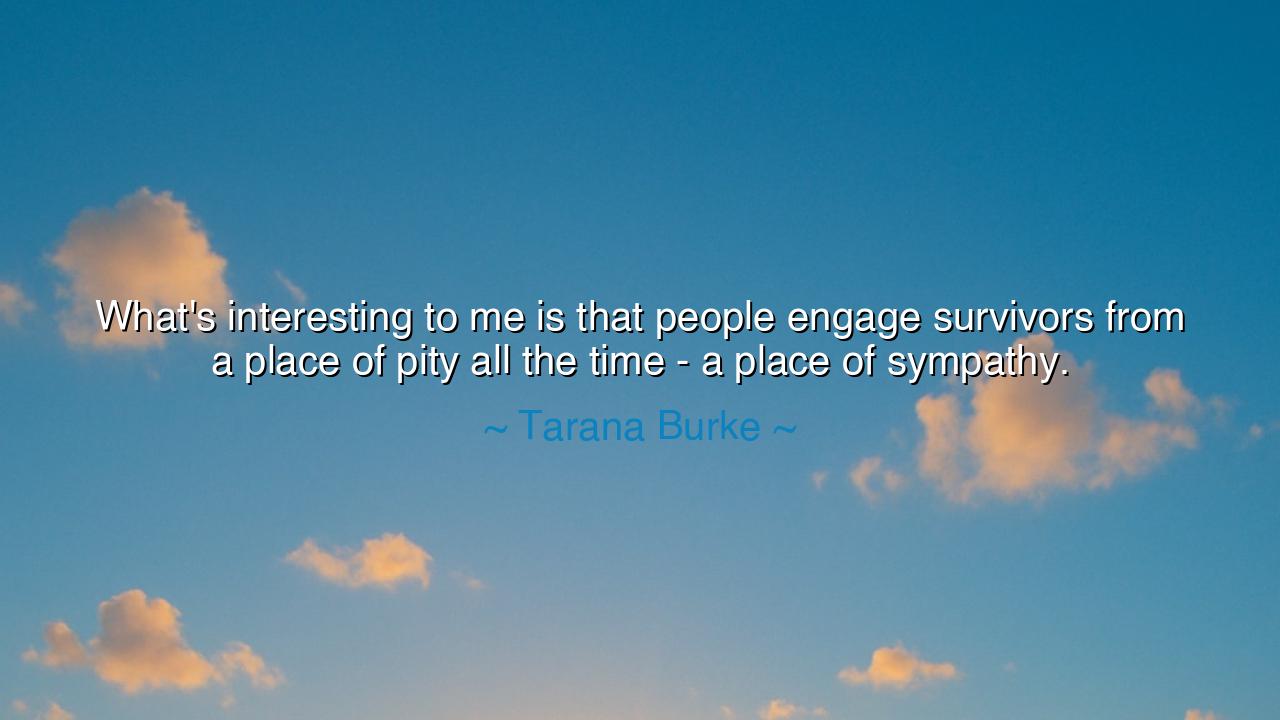
What's interesting to me is that people engage survivors from a
What's interesting to me is that people engage survivors from a place of pity all the time - a place of sympathy.






When Tarana Burke declared, “What’s interesting to me is that people engage survivors from a place of pity all the time — a place of sympathy,” she was unveiling a truth that pierces to the heart of human interaction. Her words are not gentle musings, but a call to clarity: that to reduce a survivor to an object of pity is to rob them of the dignity of their endurance. For pity, though it wears the clothing of kindness, often conceals distance and superiority. True solidarity requires something greater than sympathy; it requires recognition, respect, and the courage to see survivors not as broken vessels but as bearers of strength.
The survivor, whether of violence, of injustice, or of oppression, carries within them a fire that has not been extinguished. Yet the world, uncertain of how to face their pain, often meets them with soft words that belittle rather than uplift. To engage from pity is to say, “You are lesser. I stand above, you below.” But Burke reminds us that the role of the witness is not to diminish, but to honor. The survivor does not need to be cloaked in sorrowful glances; they need to be seen as whole, as fierce, as capable of shaping the future.
This echoes the wisdom of the ancients. Consider the story of Job, who endured immeasurable suffering in the old tales. His companions came to him, not with courage or respect, but with endless pity and shallow explanations. Instead of comfort, they gave him a sense of isolation, as if his suffering had made him untouchable. Yet Job, in his endurance, was greater than their hollow sympathy. His tale teaches that those who survive trial deserve not pity but reverence, for their spirit has endured what others could not.
Burke’s words rise also from her own labor, for she is the mother of the Me Too movement, a chorus of voices long silenced by shame and by the world’s pity. Too often, those who endured abuse were met only with whispered condolences, as if their story was something to be endured politely and then forgotten. But Burke demanded more: not shallow sympathy, but recognition of systemic wrongs, acknowledgment of resilience, and the power to reclaim voice. In this way, she transformed pity into solidarity, and silence into collective strength.
The lesson, O seekers, is profound: when you meet one who has survived hardship, do not bow your head in pity, as if you are greeting a shadow. Instead, lift your eyes and meet theirs, acknowledging the full weight of their humanity. See not only their wound, but their survival. To honor the survivor is not to drown them in sympathy, but to stand beside them as equals, and if needed, to lend your voice to amplify theirs.
Practical action is clear. When you encounter survivors in your life, choose your words with care. Do not say, “I’m sorry for you,” as though they are objects of tragedy alone. Instead, say, “I hear you. I believe you. I honor your strength.” Support them not with condescension but with partnership—by fighting the injustices they reveal, by listening without judgment, and by allowing them the dignity of their own narrative.
Therefore, let Burke’s words be carried into your heart as a shield against false kindness. Know the difference between pity, which diminishes, and solidarity, which empowers. Know the difference between shallow sympathy, which soothes the speaker, and true recognition, which heals the wounded. For in the end, survivors do not ask us to feel sorry for them—they ask us to see them as whole, as strong, as fully human. And when we do, we not only honor them, but we take a step closer to a just and compassionate world.






AAdministratorAdministrator
Welcome, honored guests. Please leave a comment, we will respond soon